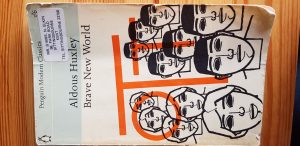All dystopian novels are warnings. And Brave New World is the grandfather of them all. Rereading it after many years, I am astonished by the things which Aldous Huxley was pessimistic about as long ago as 1932. He was writing fourteen years after the end of the First World War and seven years before the start of the second – and in the middle of a global financial crisis.
We move six centuries into the future to discover Huxley’s world in which there is no religion except for the worship of practical, pragmatic Henry Ford – “Our Ford” – and “his Fordship”. The change of initial consonant is both witty and plausible. No one is conceived or born naturally. People are bred in bottles to be one of five castes and therefore totally fitted for the life ahead of them. The word “mother” is an unspeakable obscenity. Promiscuous sex is encouraged as part of civilised life and everyone takes a mind altering drug “soma” to maintain serenity.
That’s an extremely abbreviated and banal account of the exposition. Then, of course, the boat starts to rock. Bernard Marx, hasn’t quite been conditioned fully (an error in the doses he was given before and after “decanting” or in the many thousands of night messages fed into his infant brain) and starts to ask questions. He and a reluctant young woman named Lenina visit one of the world’s only Savage Reservations (in Mexico). There they meet John and – shock horror – his mother.
John, known back in London when they bring him, simply as The Savage has read Shakespeare – a tattered old copy which turned up in the rubbish, All such subversive books have been banned for centuries. For entertainment “civilised” people have synthesised music and “Feelies” – films which give you a physical erotic sensation as long as you hold on to the arm rests in your seat.
Of course, like all the best dystopian novels this is actually a deeply thoughtful discussion about what really matters. And although the ending is a depressingly negative one the answer is that the power of the imagination and qualities such as love and loyalty are what make us fully human. Again and again – John makes you grin by coming up with an apt Shakespeare line to refute the (literally) soulless way of life he’s encountering.
What Brave New World is saying – and it’s extraordinarily topical just now – is that we have to put up with illness, pain, loss and inconvenience. They are part of being human and the pay off for togetherness, creativity, deep shared experience (such as seeing Romeo and Juliet or King Lear) which speaks to our innermost selves and much more. If you try to eliminate all discomfort and substitute artificial “happiness” you are not human any more.
Nearly thirty years after Brave New World, Huxley wrote Brave New World Revisited in which he looked to see how many of his predictions had come true and found that many had. Today it’s even truer. Overpopulation was, and is, a serious problem. The rubbish played when you’re on hold is exactly like the “music” in Brave New World. IVF technology develops every year. Cannabis will probably be decriminalised very soon. And so on and on.
There is also his last novel, Island (1962) in which he presents a Utopia – an alternative outcome to his dystopian world. I read it – but only once, I think – in my youth. I’m planning to get back to it and to explore Brave New World Revisited later this year.
Next week on Susan’s Bookshelves: The Silver Sword by Ian Serraillier
